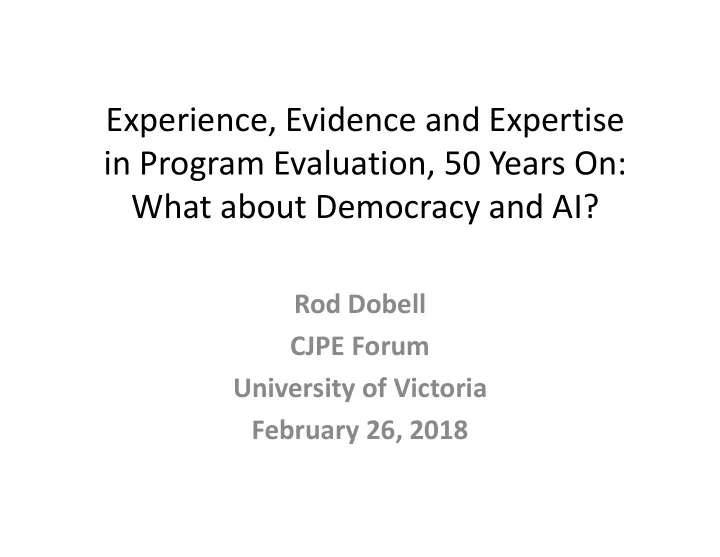

Experience, Evidence and Expertise in Program Evaluation, 50 Years On: What about Democracy and AI? Rod Dobell CJPE Forum University of Victoria February 26, 2018
Outline • We continue to debate the value of evaluation • But the context has changed dramatically • The press for inclusion in participatory processes deepens • There has been vast technological change, particularly in ICT and intelligent systems • Big questions about the role of the analyst and evaluation in governance arise • Roads to follow?
Evidence for Evidence‐Based Policy (EBP)? • …”[start] from the consensus that it has proven unexpectedly difficult to identify the successes of EBP” (French, 2018) • “And yet it moves” (Galileo Galilee, on the motion of the Earth, despite recantation) • “And yet it helps” (attributed to John Mayne on the value of evaluation, despite doubts) • “…building a toolkit of evaluation types based on more than one epistemological framework is warranted to address different questions and expectations.” (Rob Shepherd, 2018, p.22)
Dramatically different context from Trudeau I to Trudeau II • Anthropocene; post‐normal science; Sustainability Science (Clark); • From Rational Actor Model to behavioural economics; deductive reason to inductive (TEK); • From individual to collective rights • From head to heart; masculine to feminine; dual‐ process brain; (McGilchrist, Kahneman) • From representative democracy to …what? • From Marchant calculator to iPhone 11; from spreadsheets to icloud to autonomous intelligent systems
Heart, head and dual‐process brain • “The heart has its reasons that the head knows not” Pascal, Pensees, 277; • “Reason is, and always must be, the slave of the passions.” David Hume • But see Against Empathy (Paul Bloom, Boston Review) for arguments against following the heart in decision‐making and social policy • little actual evidence that analysis aids in evidence‐based policy decision‐making; • Evaluation literature advocates more inclusive, participatory analysis, more open info; how?
Potential for machine learning • Possibilities highly contested—The Singularity and arrival of artificial general intelligence? • Developing very rapidly—faster than expected: few experts anticipated AI mastery of the game of Go before 2027—happened 10 years early; • Machine learning can build on itself: given an assignment with clear rules and an agreed objective, recursively self‐improving machines can develop the necessary capacity to be the best. • Many tasks and professions have that feature of clear rules and agreed objectives. Are practitioners of evaluation also open to replacement?
New technological players
IEEE Ethically‐Aligned Design (EADv2)
Why worry about ‘friendly’ AI or ethically aligned development? • The prospect of the Singularity (Bostrom, 2008) is taken seriously by serious authorities • IEEE is a serious organization investing massive resources in the subject • The Future of Life Institute has an impressive Board of Advisors writing open letters to argue the need for research now • Years of negotiations concerning Lethal Autonomous Weapons Systems (LAWS) have failed even to develop useful definitions of ‘meaningful human control’, let alone formulate agreed restraints on weapons development
Machine learning in governance Wisdom of crowds (through ICT) Madness of mobs (through ICT) Authoritarian algorithms/AI (Koch/Fox/Russian troll farms) Ethically aligned, friendly AI
Democracy 4.0 • Democracy 4.0 is the use of modern ICTs to enable comprehensive participation in policy formulation and the inclusion of all citizens in decision‐making processes; • One option is ‘hybrid participation’, a binding combination of direct and deliberative participation (by‐passing the legislature?); • De‐representation? Within nested institutions?
‘Send in the Machines’ for Adaptive Management? “Probes using environmental DNA will detect the presence of any important fish swimming into a river section, then feed back information to an AI controller to integrate river flow levels, demand for the abstracted water and the ecological requirements of the particular fish; shutting the water abstraction off automatically if conditions are not suitable for that fish, switching the abstraction on again when the fish departs, or if flow levels rise.” (Russell G. Death, WIREs Water 2015, 2:595‐600. Doi:10.1002/wat2.1102) [Of course, we have to worry about many critters at once, each with views and objectives and agency, and about outcomes over generations, not just one poor fish at a time.]
References and Links • Bloom, Paul. http://bostonreview.net/forum/paul‐bloom‐against‐empathy • Bohn, B. 2016. Democracy 4.0: Citizen Participation Processes: A German Case Study. European Academy Berlin • Bostrom, N. (2014). Superintelligence: Paths, dangers, strategies . Oxford, UK: Oxford University Press • Clark, W.C. (2007) Sustainability Science: A Room of Its Own. Proceedings of the National Academy of Sciences, 104, 1737. • Dobell, R. (2003). The role of government and government’s role in evaluating government: Insider information and outsider beliefs (Research Paper No. 47) . Panel on the Role of Government in Ontario.. Retrieved from https://web.archive.org/web/20041103045126/http://www.law‐ lib.utoronto.ca:80/investing/reports/rp47.pdf • Dobell, R., & Zussman, D. (1981). An evaluation system for government: If politics is theatre, then evaluation is (mostly) art. Canadian Public Administration , 24 (3), 404–427. https://doi.org/10.1111/j.1754‐ 7121.1981.tb00341.x • French, R. D. (2017). Reading the evidence on evidence‐based policy . Graduate School of Public and International Affairs, University of Ottawa. • Grace, K., Salvatier, J., Dafoe, A., Zhang, B., & Evans, O. (2017). When will AI exceed human performance? Evidence from AI experts . Retrieved from Cornell University Library website: https://arxiv.org/pdf/1705.08807.pdf
References and Links cont’d • Kahneman, Daniel. 2013. Thinking Fast, and Slow . Toronto: Anchor Books (Canada) • Mader, I: 2016. The New Social Contract: From Representative to Participative Democracy (4.0). Excellence Edition • McGilchrist, I. The Master and his Emissary . Yale University Press; Reprint edition (Oct. 9 2012) • Prince, M.J. and J.A, Chenier. 1980. “The rise and fall of policy planning and research units: an organizational perspective”. Canadian Public Administration. • Shepherd, Rob. 2018. Shepherd, R. P. (2018). “Expenditure Reviews and the Federal Experience: Program Evaluation and its Contribution to Assurance Provision”. Canadian Journal of Program Evaluation , 32; 3 Page numbers unknown • Yudkowsky, E. 2004. Coherent Extrapolated Volition . https://intelligence.org/files/CEV.pdf
Recommend
More recommend